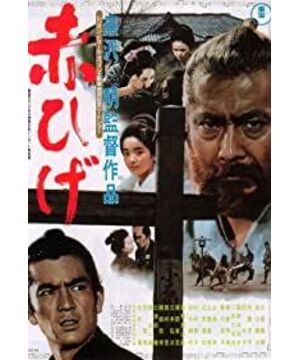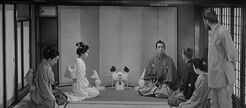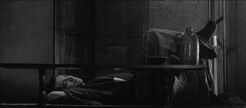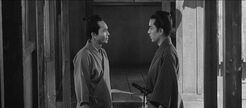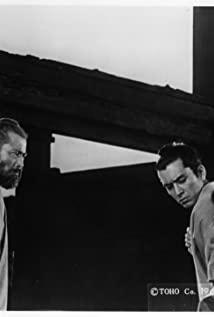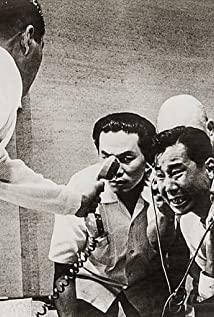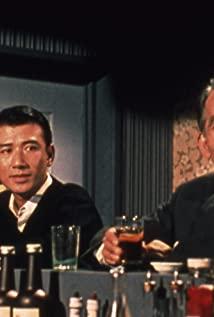Recently, I watched three movies by Akira Kurosawa in a row, namely "Rashomon", "Seven Samurai" and "Red Beard". "Red Beard" is the least well-known and the latest one. It tells a series of stories about the newly recruited doctor working under the new doctor named "Red Beard". Not as good as "Seven Samurai" and not as famous as "Rashomon". The narrative is also a bit procrastinated, and some of the plots even made people laugh, but it left a deep impression on me. In my opinion, "Red Beard" is Kurosawa Akira's most straightforward expression of his life philosophy: responsibility and dedication.
Through the black and white light and shadow, what we see is a sincere heart. We don't need to care about the ridicule of "doctors know martial arts, and no one can stop them", and we don't need to care whether the personality of Red Beard is too ideal and unrealistic. In fact, Kurosawa didn't want to make a realistic movie at all. "Will I regret staying at the small clinic in the future?" "Can the Red Beard clinic be maintained?" "Can Red Beard really beat six big men by himself?" "Is it moral to give money to the rich?" "It's too easy to ask these questions, too easy. Of course Kurosawa understands this. The good things in the world are struggling, and their lives are hanging by a thread. He just can't bear it. My favorite plot is the conversation between the twelve-year-old Afeng and the seven-year-old Xiaochang between the clothes rack. A large swath of clean white clothes gleamed in the sun, Xiao Chang asked, "You said that stealing sugar is not good, but why don't you stop me stealing porridge." Afeng thought for a while and said hesitantly, "Porridge and sugar are not the same time." It’s... I’m so hungry that I’m stealing the porridge..." I’m really afraid that someone would suddenly appear and ask, "How come porridge and sugar are not the same thing?" There was a voice in my heart that questioned me. The question made me speechless, and sweating for the children, I was really afraid to see their panic and helpless expressions. However, no. Kurosawa slightly changed the topic, not giving moralists any opportunity to comment. Give a small miracle to the simple goodness, which is goodness. I am afraid that this kind of kindness is difficult for those of our time who are keen on "revealing the truth" to understand.
Kurosawa Akira's thoughts not only stop at the pen as the heart of compassion, but he also expresses everyone's obligations. He never shy away from talking about the ugliness, hardship, and vain of the world. When performing an operation for a female worker, Red Beard must keep a close eye on the wound, and don't turn his face so that the guarantee can't bear to faint. He sees all the suffering in the world, and he chooses to endure it! Kurosawa fully understands the power of suffering that distorts human nature and extinguishes hope. He is willing to endure this despair with all his strength and melt the hard ice in the heart of the sufferer with flesh and blood. Kiku Chiyo, who played the red beard Toshiro Mifune in "Seven Samurai", shouted to the samurai, "The farmer is the most stingy and cunning character! Stupid! Cruel! Hahahaha... But who is it, who made them become? This way?! It's you! It's your samurai!..." In "Red Beard", Kurosawa gave a specific approach. When Red Beard was treating Afeng who was rescued from a brothel, he was willing to endure her attacks again and again, because he knew, "Afeng has suffered more than a person has suffered in his lifetime"; he knows that he is full of Kindness may be able to call back a desperate heart. Kurosawa is so kind, even though it's just a fictional heart in the movie, he can't bear to give up and wants to save it with all his strength. It's easy to show cruelty, but it takes great power to show goodness.
Although some parts of the film are wishful thinking to the point of innocence, Akira Kurosawa is not an optimistic and naive person. Red Beard said at the beginning that people hope that doctors can treat illnesses, but doctors are very limited. "Some people don't need to get sick. Diseases always conceal other misfortunes." For people who have no cure, Red Beard has to send them on the road with dignity (Red Beard’s so-called dignity is not turning your head away. It's not to sort out the remains, nor to pretend to be in Paradise, but to treat it as a person of personality); for people who are cured but unable to live, is it better for them to die? Red beard is also often in conflict. He said, "She may be a relief when she is dead, but I am a doctor..." The role of a doctor should be a collection of contradictions in Kurosawa's heart. He also often feels tired, surrounded by powerlessness, and plunged into self-doubt, but he has to-whether it is a professional ethical have to or a must-save it again and again. Xiaochang’s mother, who was rescued back from the family’s poisoning, asked Red Beard, “Why save us...we only have this way...how good if we don’t save us? He (Xiaochang’s father) thought he was dead and slept so peacefully. He hasn’t slept so well after we got married..." In the film, everyone is silent, and only hears the little long breathing getting faster and faster. This is the breath of the dying person. His life and death depend on The belief of our audience now. At this time, it was the twelve-year-old Afeng who had suffered countless sufferings. She begged Red Beard, please save Xiaochang. She started calling out Xiaochang’s name loudly: "Xiaochang! Xiaochang!"
"Xiaochang——Xiaochang——" it reads in the script, "like an echo, I heard a shadowy response from a distance that is not like reality." Where did the sound come from? Is it really the call of female workers as mentioned in the movie? No, this is a call from Akira Kurosawa from the bottom of his heart. At this time, everyone gathered to the mouth of the well and called Xiao Chang a soul. "The legend calls to the well, and people who are dying can also be called back, because the well leads to the deepest underground." This is the scene that touches me the most in the whole film, "Xiao Chang-Xiao Chang -" In my heart I am Also shouted with everyone. "Live! Live!" This was Kurosawa Akira's deepest and broadest confession to the world. As long as he persists until dawn, Xiaochang will be able to come alive! As long as you persist until dawn, you can live on! And dawn will always come.
This movie is a baptism for my soul. Born in such an era of individualism, it is far away from this kind of goodness. We are too smart, we always choose the easiest way, and feel at ease about it. In such a time when the virus is raging, I am not afraid that people will laugh at me.
View more about Red Beard reviews


